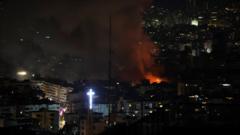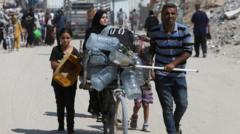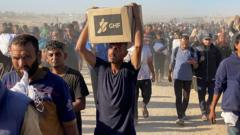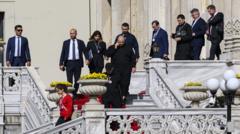On the eve of Eid Al Adha, Israel conducted multiple air strikes on Hezbollah positions in southern Beirut, claiming to target underground drone production facilities. This aggressive action, condemned by Lebanese officials, raised concerns of further instability in the region despite a lingering ceasefire.
Israeli Air Strikes Target Hezbollah in Southern Beirut Ahead of Eid Al Adha

Israeli Air Strikes Target Hezbollah in Southern Beirut Ahead of Eid Al Adha
Tensions escalate as Israel launches air strikes in Beirut, citing drone production by Hezbollah, amid ongoing ceasefire violations.
In a significant escalation of tensions, Israel conducted air strikes in the southern suburbs of Beirut on Thursday night, a move it claims was aimed at dismantling a Hezbollah unit that allegedly produces drones. The timing of the strikes, which coincided with the eve of Eid Al Adha, a major Islamic holiday, led to widespread condemnation from Lebanese authorities, who described the attacks as systematic aggression against the nation’s security and stability.
Israel's military stated that the air strikes were necessary due to Hezbollah's extensive use of drones in its military operations against Israel, which they termed a direct violation of existing ceasefire agreements. The Israeli Defence Forces (IDF) specifically pointed to a Hezbollah underground facility believed to be producing "thousands" of drones, which they claimed to be financed by Iranian entities.
In anticipation of the strikes, the IDF issued evacuation warnings for residents in multiple neighborhoods in the densely populated Dahieh area, leading to chaotic scenes and significant traffic congestion as thousands fled the area. Lebanese Prime Minister Nawaf Salam lambasted the attacks, stating they were deliberately timed to undermine Lebanon’s security during a period of celebration.
Lebanese President Joseph Aoun described the air strikes as a blatant infringement of international law, especially given their occurrence on the eve of a significant religious festival. Meanwhile, Hezbollah remained silent on the latest attacks.
This incident follows a period of ceasefire that had been largely respected for the past six months, although Israel had previously engaged in air strikes targeting Hezbollah-related sites after cross-border hostilities intensified last year. The ongoing turmoil suggests that the fragile peace in the region remains highly precarious, as global and local observers watch the developments closely.
Previous Israeli bombings in Lebanon had resulted in significant civilian casualties, raising alarms about the humanitarian impact of such military actions. As tensions escalate once more, the potential for further conflict looms large over both Lebanon and Israel.





















